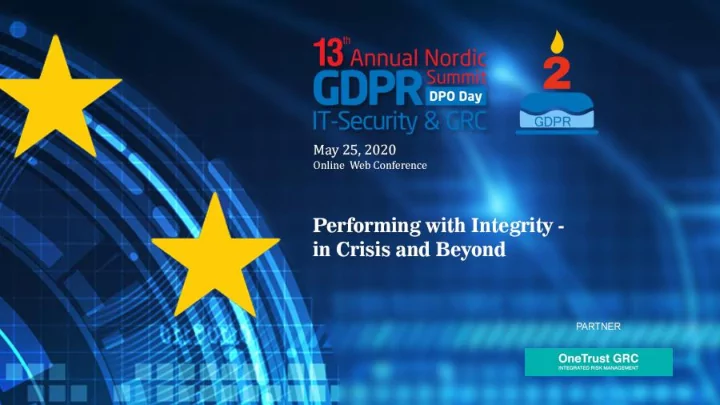

Welcome and In Introduction
13th Annual Nordic GRC/GDPR Summit Kersi F. Porbunderwala, CEO, The EUGDPR Institute • Update of the GDPR, data Privacy and data Protection concerns and issues across the European Landscape.
https://edpb.europa.eu/our-work-tools/our-documents/other/contribution-edpb-evaluation-gdpr-under-article-97_en
EDPB Annual Report https://edpb.europa.eu/sites/edpb/files/files/file1/edpb_annual_report_2019_en.pdf
The 2 year evaluation of f GDPR under Article 97 by EDPB • EDPB is positive of the implementation of the GDPR and does not recommend revision of the legislative text • Rather intensify efforts towards the adoption of an ePrivacy Regulation for data protection and confidentiality of communications. • International transfers: Focus on current work on binding corporate rules, codes of conduct, certification mechanisms and administrative arrangements for transfer of data • No pressing need to bring the existing set of SCCs in line with the GDPR and to draft additional SCCs that cover new transfer scenarios. • The adoption of processor-to-processor SCCs allows for appropriate framing of such transfers in accordance with Article 46 GDPR.
Transfers of f personal data to third countries • Transfers of personal data to 3 rd countries form an integral part of the digital environment. • Engage in the context of an adequacy decision. • Adequacy decisions are an important tool to ensure the continuous protection of personal data transferred from the European Economic Area to third countries and International organisations. • Provide independent assessments to the strengthen enforceable rights, effective redress and safeguards concerning data transfers. • Participate in the evaluation of current adequacy decisions and the adoption of future ones, while emphasising that it needs to receive all relevant documents in time to allow for a thorough assessment.
Supervisory Authority; Challenges • Identified challenges in implementing cooperation and consistency mechanism. • Due to the patchwork of national procedures and practices that has an impact on cooperation mechanism. • Cooperation between data protection authorities must result in a common data protection culture and consistent monitoring practices and examine possible solutions for a common application of key concepts • Differences in complaint handling procedures, • position of the parties in the proceedings, • admissibility criteria, • duration of proceedings, deadlines, etc. • Identify and monitor the national procedures that hinder the full effectiveness of the cooperation mechanism and recommend further harmonization. • Resources at the member states SA are insufficient to carry out the tasks • This applies particularly to the one-stop-shop mechanism, as its success depends on the time and effort that SAs can dedicate to individual cases and cooperation
Complaints since May 2018
Corrective Powers of f the SA art. 58(2)(a) - warnings 6 AT, BE, CY, CZ, DE, EE, FR, GR, HU, IT, LT, LV, MT, UK art. 58(2)(b) - reprimands 7 AT, BE, BG, CY, CZ, DE, DK, EE, ES, FI, FR, GR, HU, IT, LT, LV, MT, NL, NO, PL, RO, SE, SK, UK art. 58(2)(c) - order to comply with data AT, BE, BG, CY, CZ, DE, DK, EE, ES, FI, FR, HR, HU, subject’s requests to exercise individual IS, IT, LT, LU, LV, MT, NO, PL, PT, RO, SE, SI, SK rights
Corrective Powers of f the SA art. 58(2)(d) - order to bring AT, BE, BG, CY, CZ, DE, DK, EE, ES, FI, FR, processing operations into GR, HR, compliance HU, IS, IT, LT, LV, MT, NL, NO, PL, PT, RO, SE, SI, SK AT, DK, FI, FR, HU, IS, IT, MT, PL, LV art. 58(2)(e) - order to communicate a data breach to the data subject art. 58(2)(f) - temporary or definitive AT, DE, DK, GR, HU, IS, IT, LT, MT, NL, PT, RO, SI limitation, including a ban on processing
Corrective Powers of f the SA art. 58(2)(g) - order of rectification or AT, BE, BG, CZ, DE, DK, EE, ES, FI, HR, HU, IS, LU, LV, erasure or restriction of processing, and NO, PL, PT notification to recipients art. 58(2)(h) - withdrawal of certification / / order to certification body to withdraw certification or not to issue certification AT, BE, BG, CY, CZ, DE, DK 9 , ES, FR, GR, HU, IT, LT, art. 58(2)(i) - administrative fine 8 LV, MT, NL, NO, PL, PT, RO, SE, SK / art. 58(2)(j) - order to suspend data flows to a recipient in a third country EE (precept with penalty payments), NL Additional powers under national law (Incremental penalty payment), FI (conditional fines), FR (order under a daily penalty), UK (Notices of intent; Enforcement Notices; Preliminary Enforcement Notices)
Conclusion 1. Strike the balance between protection and industrial competitiveness and innovation so that the development of new products and services are not blocked. 2. Incentivise data protection compliance and strategy as a business enabler for data- driven innovation. 3. Enforcement challenges from the Internet of Things (IoT) to artificial intelligence (AI) 4. Conflicting Data retention schedules on local laws, but guidance from DPAs is limited. 5. Vigorous enforcement has resulted in further investment in data protection compliance across the industry 6. Uncertainty regarding the right to limit processing as well as regarding data portability. 7. Uncertainties regarding pseudonymisation and anonymisation 8. DPAs must launch consultations in parallel with European Data Protection Board (EDPB) initiatives on the same matter 9. Transparency obligations under Arts 13 and 14 have led to an overload of information 10. Legitimate interest can result in more conscious and protective processing activities.
Recommend
More recommend